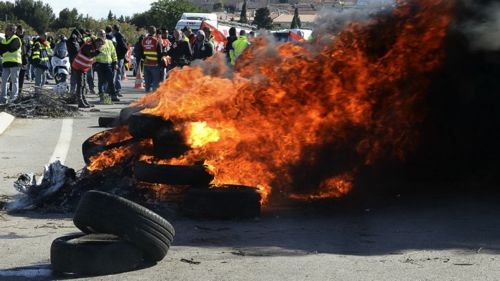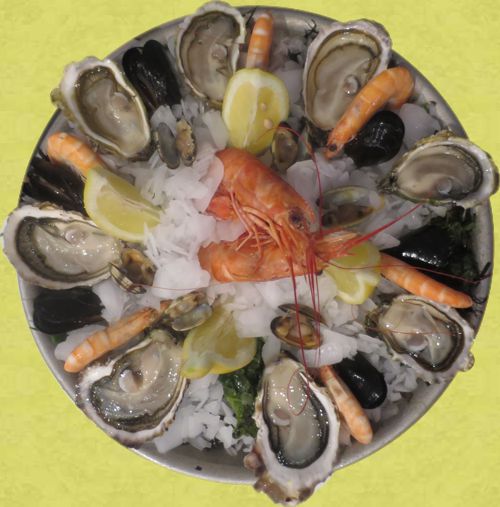| itinerary < Sète 27 May Canal du Midi > | Sète 26 May 2016 |
|
“France is in a mess. This is distressing because France will be lagging behind and the world will not wait for the country to play catch-up.” – Sylvain Attal, in an op-ed for France-24 While we haven't been inconvenienced yet, that may be because we haven't left Sète since the fun began. We are variously assured that all's going to be fine (and that's our plan) while also seeing that the press is increasingly in a twitter about what's going on. It's a fight to the death between a militant fragment of labor and a failing government, and eventually, it's going to piss us off. |

|
|
The real problem is unemployment: in France it's been running above 10% since 2009. The labor "reforms" are, by US standards, pretty gentle, given that French workers enjoy what seems to us an incredibly generous workplace. That's the problem. It's so generous that companies seek to locate elsewhere, in part because this nonsense of striking at the heart of commerce is so entrenched in the country's habits. Minor changes in the way overtime is calculated (still a 35 hour work week, but now it's to be average subject to negotiations between employers and local unions) and the ability for troubled employers to adjust wages and eliminate redundancies (read: fire entrenched incompetent workers; this is the bit that really riles the CGT. (France's major unions get it, and reluctantly (with a French shrug) concur. This issue, called featherbedding, was resolved in the 1960s in the US.) to stay in business – measures that have been accepted as necessary most everywhere but in France. Without such reassurances, French employers have let their workforces dwindle by attrition, by shifting operations offshore, and by otherwise cutting their exposure in France. In his op-ed, Attal leads off by quoting eminent French sociologist Michel Crozier, who wrote in 1971, "Society does not change by decree,” (La Société bloquée). Even then, nearly a half century ago, Crozier denounced the archaic nature of the French administration and the inability of its leaders to reform the country at times of great upheaval. Crozier (and others) makes the point that France is governed by an elite who all went to school together, have never worked outside of government, and are therefore unprepared to foment change. Likewise, clearly, the dragons in the unions want to turn the clocks backwards, but only on issues that serve them. To the best of my ability to understand, these two forces appear to be in opposition but are actually both working to drag France out of the modern global community ...not unlike the "America First" rhetoric we hear from The Donald. Attal concludes his piece thus: "And so we are condemned to watch, dumbfounded, these images from another century with riot police clashing with hardline union members at oil depots against a backdrop of burned police cars, in a country that seems frozen in the past and worse, seems bereft of the leadership to guide it into the future." |
 |
So let’s do lunch.Today is mostly dedicated to preparations for a week on a boat, and we missed lunch at Les Halles, the original plan, and so went back to Chef Francois's place where we enjoyed Sunday lunch so much. (The eagle-eyed reader will also note the absence from yesterday's report of any food. We did not go hungry; just nothing memorable.) This time, we went with the classic Sètois meal, la coquillage (shellfish), mostly from the Étang de Thau, an incredibly rich food source. (I am ashamed to report that the shrimp are drag-fished from the Med, a body of water that has been abused for so long it's amazing there's any life left in it at all.) We did a little shopping, a little packing, a little napping, a little reading, and prepared to go out in search of gasoline tomorrow early on our way to leave our car in Narbonne and catch our ride to Le Somail and our boat. |
|
With a little time to spare, we walked out to the Museum de la Mer, a celebration of Sète as France's original port on the Mediterannean. From the late 17th Century, when the port was built, it has been the center for fishing the Med, as well as for boat building. The title of Most Important passed to Marseille during the 20th Century, but according to Patrick, Sète is still the most important fishing port. Boatbuilding was a major activity here into the 1950s, when plastic and metal supplanted wood. About then, the grandson of one of the great boatbuilders realized that theirs was an art getting ready to disappear ...and so made one-tenth scale models of the several forms of boats that he, his father, and his grandfather launched from Sète. |
 The tricky joinery at the knee of the prow of a wooden boat |
|
Recognizing the importance of his preservation work, and the intrinsic value of generations of wisdom associated with fitting wood to work in water, Sète's city fathers built a museum around his models. I was struck by the relationship noted by the model builder, André Aversa, and best expressed by Sète's native poet, Paul Valéry: "La libération de l'homme par le travail n'est pas pleinement réalisée que dans l'artisinat où la main atteind l'esprit et ne fait qu'un avec lui." Roughly translated as "A man's craft-work is not entirely freely realized until the hand and the spirit become one." Something to work for, hien? And for the French union CGT, what a notion: the liberation of man through work! As one bitter French fellow said, "they just hate to work, and jump at the slightest chance to shirk ...the bastards!" |
 |
updated 18 November 2024 Caspar Time site software and photographs by the Caspar Institute except as noted this site generated with 100% recycled electrons! send website feedback to the CI webster © copyright 2002-2024 Caspar Institute |